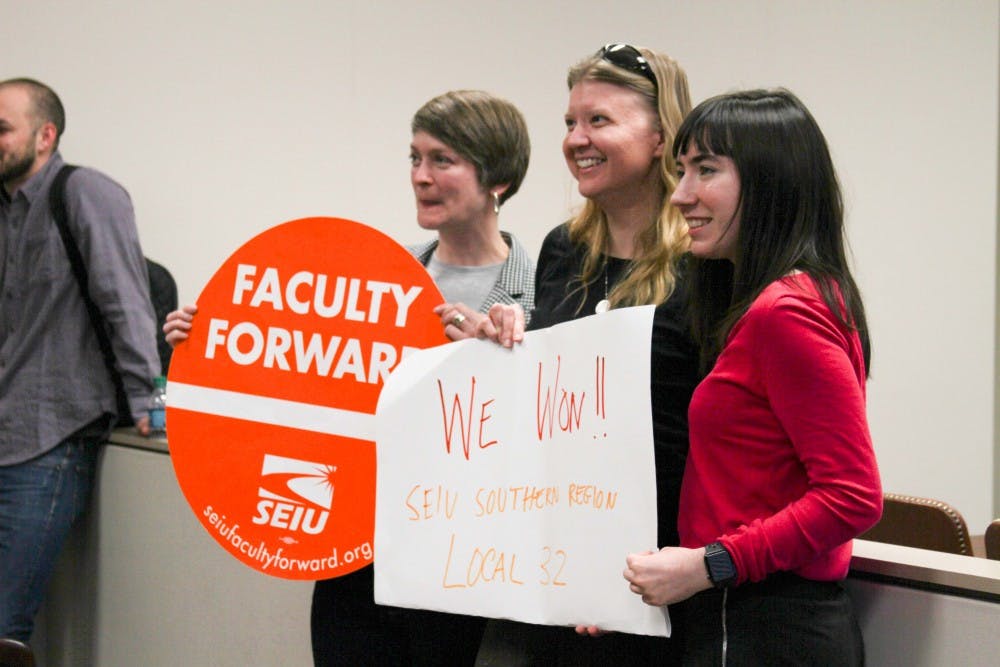After the National Labor Relations Board reaffirmed the non-tenure track faculty members’ right to unionize, Elon University’s Academic Council and chapter of the Association of American University Professors both released statements urging the university to begin bargaining with the union.
The Academic Council, which serves as the coordinating committee of faculty, issued a statement on Feb. 23 recommending that Elon University President Connie Book, Provost Aswani Volety and the board of trustees accept the NLRB decision and begin bargaining with the union. Lee Bush, chair of the academic council, declined to comment beyond the statement issued.
The statement said the academic council believes both the university and the union have had “an adequate opportunity” to express objections and perspectives since the unionization process started in 2018.
“In the interest of upholding fairness and democratic values, it is time for Elon to move past legal appeals and work together with our part-time colleagues to address their grievances and concerns,” the statement said. “We believe that we will be stronger if we all move forward together. In doing so, Elon can be a leader in showing how the addition of the union can be an integral part of our commitment to a vibrant and inclusive shared governance system.”
In an email to faculty and staff members following the decision, Volety wrote that the NLRB agreed with the university’s request to revise the standard that determined whether or not “part-time faculty” are managerial employees. With the new standard, the NLRB affirmed that Elon University did not prove that non-tenure track faculty are managerial employees, and reaffirmed the union.
The final decision stated that the university did not prove that non-tenure track faculty members are structurally included in the university’s faculty bodies, which is a factor in whether or not a faculty member is considered managerial.
“We are carefully reviewing this very complex decision and will consider all available options in support of our collaborative model of shared governance before making a decision about next steps,” Volety wrote. “As always, we remain committed to working with all faculty with respect, transparency and collegiality.”
A university spokesperson declined to comment further on the ruling.
In an email to all faculty and staff members, the union provided more information regarding the NLRB decision and how it will impact the Elon Faculty Union. Jim Roberts, organizing committee member and adjunct instructor in music, said the union wanted to make sure faculty had “all the facts” about the NLRB case.
“Unfortunately, there were major omissions from Dr. Volety's email so we felt compelled to respond,” Roberts wrote in an email to Elon News Network. “All faculty have the right to be fully informed about issues that affect the university.”
Roberts said the union has received support from alumni, students, full-time faculty, Elon donors, Duke University adjunct faculty and faculty groups on Elon’s campus.
“They are our colleagues and many of them may have been adjuncts in the past so they know how challenging it is to be an adjunct,” Roberts wrote. “This should stand as a test to see if we really have shared governance at Elon. If we do, the administration will listen and follow their recommendations.”
The executive committee of the Elon University chapter of the American Association of University Professors also issued a statement in support of the NLRB decision on Feb. 24. The AAUP affirmed the NLRB decision “in light of” of the university’s commitment to the democratic process, in reference to the Elon University faculty handbook.
The statement also said the AAUP executive committee believes the “most effective way” for the university to support non-tenure track faculty members is to recognize and negotiate with the union to guarantee their rights.
“For the university not to engage in collective bargaining now could lead to unfair labor practices charges, prove time consuming, and would also be wasteful of precious economic resources,” the statement said. “Moreover, negotiating with the Union is simply the right thing to do.”
The union is currently reaching out to the administration for “relevant information” about non-tenure faculty members and to set a timeline to negotiate contracts, according to Roberts.
When the university works with the union, Roberts said it will not only improve non-tenure faculty members’ working conditions, but benefit students’ educations, too.
“The most important story is really about the adjuncts that are struggling to make it through the pandemic and to survive. Rent, medical expenses, and even food insecurity are among the challenging issues that many adjuncts face,” Roberts said. “Let us not miss this important story. In order to give our best, basic needs need to be met.”


